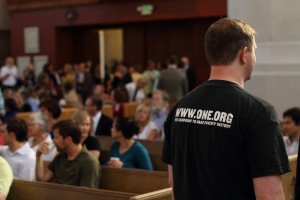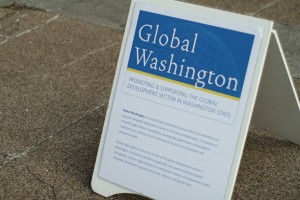Global Washington forum
 As a member of ONE(.org) I was asked if I wanted to attend a Global Washington forum with USAID Administrator Rajiv Shah, Chris Elias (CEO of PATH), Sylvia Mathews Burwell (President, Global Development Program, Gates Foundation), Congressman Jim McDermott (D-WASH), Congressman Adam Smith (D-WASH), and several other speakers. The event was held last Friday the 13th at St. Mark’s Cathedral at the north end of Capitol Hill.
As a member of ONE(.org) I was asked if I wanted to attend a Global Washington forum with USAID Administrator Rajiv Shah, Chris Elias (CEO of PATH), Sylvia Mathews Burwell (President, Global Development Program, Gates Foundation), Congressman Jim McDermott (D-WASH), Congressman Adam Smith (D-WASH), and several other speakers. The event was held last Friday the 13th at St. Mark’s Cathedral at the north end of Capitol Hill.
I have mixed emotions about attending these sort of events, because important things do get said and discussed at these type of forums, but also my personality lends itself much more to action than theoretical or academic discussion. Especially when our leaders (and the experts who advise them) already know much of what we need to be doing, and know that we are not doing it. The average American believes that foreign aid spending is a huge proportion of our discretionary expense, when in fact it makes up less than 1% of our federal budget. Furthermore, 35 years ago rich UN member countries pledged to donate .7% of their GNI to foreign aid, and the US has never even come close to meeting our pledge. This pledge was renewed in Brazil in 1992, and again at our highest point (the 1980s) we reached only .35%. US politicians and diplomats like to talk about how we give more than any other country in terms of gross dollars (which is generally true), but as a proportion of income we have historically ranked last in the world in GNI foreign aid spending, and currently we rank 5th from last (underspent only by Greece, Italy, Japan, and South Korea).
My point here is not that Americans aren’t generous — I believe Americans, and people in general, to be compassionate and extremely generous. The problem is that the people who make decisions about our federal spending are often influenced by factors other than their constituents’ desire to be generous. We manage to find billions of dollars per day to spend on our war efforts, yet risk a resurgence of millions of measles deaths because $59 million is seemingly too much to pledge this year so that we may vaccinate children in poor countries. And again, I wish to restate that I believe Americans would happily spend that $59 million; they just don’t know it’s missing. And forums like this, where administrators tout how much we spend [in terms of total dollars and not GNI] on foreign aid (something I heard Rajiv Shah do) perpetuate that mistaken belief.
![]() I also heard Mr. Shah speak briefly of the benefits of the green revolution, yet another place where I think one can easily make the argument that adminsitrators make self-serving and one-sided statements in the interest of their organizations without properly addressing both sides of the issue. The green revolution has many arguments for and against, and in many places has done as much long-term harm as good; to laud its successes within a single breath and move on is disingenuous.
I also heard Mr. Shah speak briefly of the benefits of the green revolution, yet another place where I think one can easily make the argument that adminsitrators make self-serving and one-sided statements in the interest of their organizations without properly addressing both sides of the issue. The green revolution has many arguments for and against, and in many places has done as much long-term harm as good; to laud its successes within a single breath and move on is disingenuous.
I don’t mean to sound entirely negative, I think USAID does good work, and I do not doubt the motivations of the persons involved in this forum, I simply feel that forums like these can often be an excuse to extol the virtues of bureaucracies rather than have a serious discussion about what further can be done to help those who live in extreme poverty. These sort of forums are often full of platitudes and back-patting, and I am much more interested in focusing on the people who still need help, and on moving rapidly to effectuate positive and lasting outcomes for those people.
Secretary of State Clinton also just gave a speech about the Global Health Initiative, again with some platitudes, but also a lot of promising aspects.
I took some photos of the Global Washington event, selects of which will appear below.











